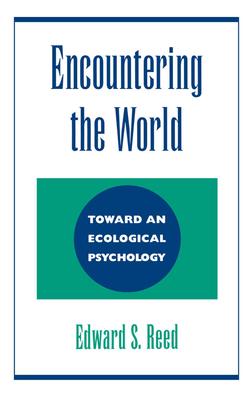Encountering the World reorients modern psychology by finding a viable middle ground between the study of nerve cells and cultural analysis. The emerging field of ecological psychology focuses on the "human niche" and our uniquely evolved modes of action and interaction. Rejecting both mechanistic cognitive science and reductionistic neuroscience, the author offers a new psychology that combines ecological and experimental methods to help us better understand the ways in which people and animals make their way through the world. The book provides a comprehensive treatment of ecological psychology and a unique synthesis of the work of Darwin, neural Darwinism, and modern ecologists with James Gibson's approach to perception. The author presents detailed discussions on communication, sociality, cognition, and language--topics often overlooked by ecological psychologists. Other issues covered include ecological approaches to animal behavior, neural mechanisms, perception, action, and interaction. Provocative and controversial, Encountering the World makes a significant contribution to the debate over the nature of psychology.
| FindBook |
有 1 項符合
Encountering the World: Toward an Ecological Psychology的圖書 |
 |
Encountering the World 作者:Reed、Edward S 出版社:Oxford University Press, USA 出版日期:1996-08-29 語言:英文 規格:精裝 / 224頁 / 24.4 x 16.3 x 1.8 cm / 普通級 / 初版 |
| 圖書館借閱 |
| 國家圖書館 | 全國圖書書目資訊網 | 國立公共資訊圖書館 | 電子書服務平台 | MetaCat 跨館整合查詢 |
| 臺北市立圖書館 | 新北市立圖書館 | 基隆市公共圖書館 | 桃園市立圖書館 | 新竹縣公共圖書館 |
| 苗栗縣立圖書館 | 臺中市立圖書館 | 彰化縣公共圖書館 | 南投縣文化局 | 雲林縣公共圖書館 |
| 嘉義縣圖書館 | 臺南市立圖書館 | 高雄市立圖書館 | 屏東縣公共圖書館 | 宜蘭縣公共圖書館 |
| 花蓮縣文化局 | 臺東縣文化處 |
|
|
圖書介紹 - 資料來源:博客來 評分:
圖書名稱:Encountering the World: Toward an Ecological Psychology
內容簡介
作者簡介
Edward S. Reed, Ph.D. is Associate Professor of Psychology at Franklin & Marshall College. His research on ecological psychology has been supported by the National Science Foundation, the National Endowment for the Humanities, the National Institute on Disabilities and Rehabilitation, and a Guggenheim fellowship.
|











